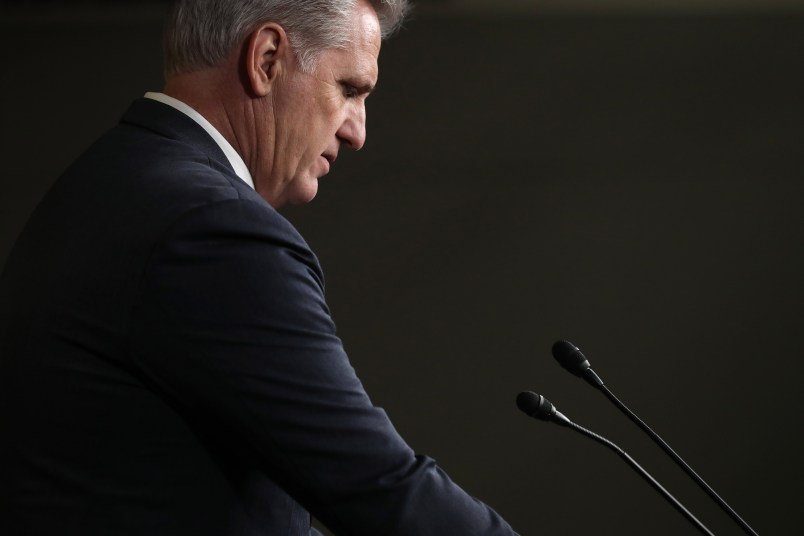House Republicans reportedly told Democrats ahead of Wednesday’s impeachment vote proceedings that they’d limit their procedural objections in exchange for an extra hour of debate time. But that didn’t stop House Republican leadership from using the first hour of proceedings to make dense and often murky procedural protests, while accusing Democratic leadership of intentionally violating House rules.
Just as proceedings kicked off, Rep. Andrew Biggs (R-AZ) immediately addressed Speaker Pro Tempore Diana DeGette (D-CO) and filed a motion to adjourn “so we can stop wasting America’s time on impeachment.”
DeGette called for an oral vote on adjournment, ruling the majority Democrats had the vote, but Biggs insisted on a slower, recorded vote. That pattern continued among Republicans for the next hour.
House Minority Leader Kevin McCarthy (R-CA) attempted to submit a resolution to the record shortly thereafter, a document that accused House Judiciary Committee Chair Jerry Nadler (D-NY) and House Intelligence Committee Chair Adam Schiff (D-CA) of “intentionally” violating rules of the House by “abusing and exceeding their powers as chairmen” throughout the entirety of the impeachment inquiry. The lengthy resolution criticized everything from Schiff’s handling of the whistleblower’s complaint to Nadler’s allowance of only one minority witness during the Judiciary’s hearing. House Majority Leader Steny Hoyer (D-MD) called for a vote to reject McCarthy’s objection. While Democrats clearly had the votes to table it, McCarthy followed Biggs’ lead and requested a recorded vote.
McCarthy accuses Nadler, Schiff of breaking House rules throughout impeachment process pic.twitter.com/xleAyO70lR
— TPM Livewire (@TPMLiveWire) December 18, 2019
House Minority Whip Steve Scalise (R-LA) made one more procedural objection before the floor opened for six hours of debate, raising a point of order against House Rules Committee Chair James McGovern’s (D-MA) attempt to officially open impeachment proceedings. Scalise argued the majority had committed a procedural failure by not allowing the minority to have a hearing day during the Judiciary Committee’s undertaking of the impeachment inquiry.
DeGette shot Scalise down, arguing the issue was a matter of debate rather than a proper point of order.
The efforts were not unexpected. Procedural criticisms have emerged as a main weapon for Republicans throughout the process — a tactic prominently on display during the House Judiciary Committee’s drawn-out impeachment hearings.



